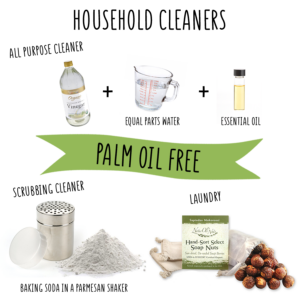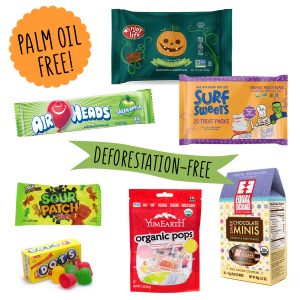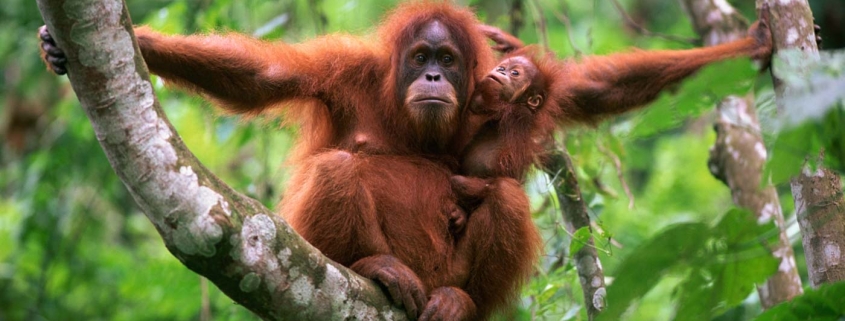Problem with Palm Oil
Palm oil is the leading cause of orangutan extinction. It’s in 50% of all household and food products sold in the West. It’s an ingredient in shampoo, toothpaste, detergent, frozen microwave dinners, cookies, peanut butter, lotion, makeup and much more!
Palm oil is a type of vegetable oil made from the fruit of the African oil palm tree, which originates in West Africa. However, it can be grown successfully in any humid tropical climate and has taken a strong foothold in Indonesia.
Not only is Palm Oil bad for the environment, and a major cause of climate change, but it is also the leading cause of orangutan extinction.
Every year it is estimated that between 1,000 to 5,000 orangutans are killed in Palm Oil concessions. That is a significant portion of the wild orangutan population which is lost–without fail–every single year.
It’s not too late! This horrific trend can be stopped with a little help from all of us. Your consumer dollars can be the key to help save orangutans from extinction. The palm oil industry only thrives as long as there is a demand for palm oil and consumers keep buying products that contain palm oil. The way that consumers spend their money determines what gets produced and what gets sold.
Say NO to palm oil, and encourage your social circle to boycott palm oil. Many people are unaware of how many products contain palm oil, how many names palm oil goes by, and the dire conservation crisis facing wild orangutan populations and their tropical rain forest habitats. Start a conversation including ways in which we can help. Point them to orangutan.org/palmoil for more info.
Working together to eliminate palm oil consumption from our lives, we can weaken the demand for palm oil and stop orangutans from getting killed. It’s that simple!
Let companies know you care. Email to express your concern that a product contains palm oil, or submit inquires to see if a product contains any form of palm oil, including “sustainable” or RSPO palm oil. OFI supports a 100% boycott of palm oil, as certification schemes such as “RSPO” continue to permit deforestation and the destruction of peatland forests for plantation development.
DIY! (“Do it Yourself”) Many of the products that most commonly contain palm oil are easy to make at home. Check out this easy starter list from Selva Beat.



As a follow up to our article on the dirty palm oil industry, we aimed to compile a list that combines two important considerations for truly cruelty-free and sustainable food and products: that they are vegan, and that they are palm oil-free. Unfortunately there are few companies switching to non-use of palm oil, so we expanded the list to include companies that source ‘certified sustainable’ palm oil or are aiming to in the future.
However, there is growing uncertainty in the green community about the reliability of ‘green’ palm oil, with many environmental organizations including Greenpeace, dubbing all palm oil sources certified by the RSPO and other organizations as ‘greenwash’. Corporate members of the RSPO have been found to be some of the most active companies involved in deforestation. Other companies however attest that certification is a small but initial step in a wider movement towards addressing the problem of palm oil- in exactly those terms. After deciphering much of the jargon we were sent after inquiring about corporate palm oil policies, we cataloged their replies and provided easy links for readers to contact companies themselves. Although companies that use certified palm are listed on the second list, it’s probably best to avoid palm oil altogether if possible, until the mainstream alternative becomes a truly green, sustainable and environmentally accountable way of sourcing palm oil.
Every company we emailed, bar one, replied within 24 hours of me sending the email. These companies want to know what the consumers want. They want to make money from us and if we ask them not to source palm oil at all, they will certainly take that into account.
Don’t feel helpless after reading about the horrific impact of the palm oil industry – you can do a lot with just these lists. Email companies to ask that they reduce their consumption of palm oil, or to go palm oil-free altogether. Or you can do more. Consider checking up on the companies that make the products you use, particularly food items as that is where most palm oil ends up. If the company offers you greenwash or is strangely silent on the issue, drop them an email to see what their policies on palm oil are. Remember, when it comes to rainforests and the countless species that inhabit them, and whether or not they survive,
Borneo is the third largest island in the world, and forty years ago it was covered with dense rainforest. As you read this, loggers in the Borneo rainforest are chopping down the trees, acre by acre. They will burn the wood, which will release huge quantities of greenhouse gases into the atmosphere. Then they will plant a palm oil plantation, use the fruit and kernels to make oil, and sell it to massive corporations who will use it in every commercial product imaginable, from washing powder, to chocolate, to soap. It sounds like a straightforward commercial enterprise. So what’s so ‘dirty’ about palm oil?
The environmental impact
The deforestation of the Borneo rainforest involves draining its natural peat swamp forests which store huge amounts of carbon that are released into the atmosphere when they are dug up. According to Greenpeace’s in-depth report on the palm oil industry in Borneo, titled Cooking the Climate, the incineration of South East Asia’s peat forests has released 1.8bn tonnes of greenhouse gases into the atmosphere. In statistical terms these gases count for 4% of climate-change emissions globally, from only 0.1% of Earth’s land. Most of the cleared land was used to grow palm oil plantations.
In addition to this, the mass clearing of trees for farmland disturbs the ecosystem of the rainforest by decimating rare and exotic flora and fauna. With the planting of a single crop plantation, the natural biodiversity of the rainforest is lost. The mono-crop culture that has long-plagued environmentalists in the west displaces or destroys most of the species in a single sitting, as they are unable to adapt to living within vast acres of a single crop. The environment, habitats and species that are destroyed have lived together since the dawn of the rainforest, and the damage caused by palm oil farming is irreversible. In the words of WWF employee Junaida Payne, transporting this type of agriculture to the rainforest creates ‘biological deserts’.
According to a report by the United Nations Environment Programme (UNEP), the deforestation that has already taken place in Indonesia for palm oil, and the illegal logging that is still occurring there now, indicate that most of the country’s rainforest will have been destroyed entirely by the year 2022.
The animal impact
A more widely-discussed topic in relation to the ills of the palm oil industry is the loss of endangered species. The orangutan, Asian elephant, Sumatran rhino, and Sumatran tiger are all species whose survival hangs by a thread, to name a few examples. The orangutan’s natural habitat is within the trees of the rainforests of Borneo and Sumatra, and without these they cannot survive. Serge Wich of the US Great Ape Trust states that: ‘Unless extraordinary efforts are made soon, it could become the first great-ape species to go extinct.’
The human impact
The mass deforestation that goes hand-in-hand with the palm oil industry also displaces native peoples. They lose the land they have always lived on as well as a precious symbiotic relationship with the rainforest environment. Indigenous groups are evicted from the land to make way for palm oil plantations, and they are powerless to fight back, particularly since much of the logging that takes place is illegal.
Who’s the culprit?
In 2010, Unilever was named as the world’s biggest buyer of palm oil, counting for 3% of total world palm oil production. Other large investors in this environmentally destructive industry are food companies Kraft and General Mills, HSBC bank, agribusiness giant Cargill, and food manufacturer Nestle. Corporations that have been leading palm oil expansion into Indonesia’s peatlands include Gillette, Burger King and McCain.
Other popular brands are also huge investors in the palm oil industry. If you buy products such as Kellogg’s cereals, Hovis bread, Cadbury’s chocolate bars, Flora margarine, Persil washing powder, or anything from Premier Foods, you are likely contributing to the devastation of the rainforests and all its inhabitants, because in many products palm oil is an unlisted ingredient. It can simply be listed as ‘vegetable oil’. Australian citizens have been putting pressure on their government to make it a law for manufacturers to clearly list palm oil as an ingredient in their products. Although the amounts found in individual products are small, they add up to large swaths of rainforest destruction and habitat and species depletion in the Borneo rainforest.
Until recently, palm oil was being added to fuel, as per the EU Biofuels Directive initiative, however due to warnings from several major environmental bodies, a moratorium has been placed on this directive. The impact of this dirty industry is clear.
So What Can We Do?
Spread the word. Share this article. Tell your friends. Bring it up in conversation with family members. Despite much media attention being given to the subject of palm oil, many consumers are still unaware of the profound destruction that is being caused by this industry to our planet. If things don’t change soon, Borneo will have no rainforest left.
Boycott all palm oil products. Ditch the dirty companies. Consumer power counts for everything when it comes to palm oil. You can use this list to ascertain which products to support instead (note: not all the products on this list are vegan-friendly).
Put pressure on manufacturers to source sustainable palm oil or to not use it at all. Write to companies, start local campaigns, organize direct actions. Sign the petitions that are already available online- go here and here, for a start.
If you are a manufacturer, source your palm oil sustainably, or not at all. Local companies are more likely to adapt to these demands if asked to do so by the customers, or if they already have an ethical manifesto. The British cosmetics company Lush has stopped using palm oil altogether, opting to use coconut oil in its products instead.
Put pressure on the government to pass a law stating that products containing palm oil must be clearly labeled. Write to your local MP/governor to see what he or she is doing about the unclear labeling. Start a petition. Gather support. Make a noise about it.
Support rehabilitation projects in Borneo such as the Borneo Orangutan Survival (BOS) Foundation. One of their reforestation projects transformed a 2,000 hectare wasteland into a thriving forest within just a few years. Give them your spare change, start a collection for them, or stage an event to fundraise for them and spread awareness of their cause.
The list goes on. There is a huge amount of work to be done to rectify the decades of environmental impact that the palm oil industry has had on the rainforests of our world. The points listed above are just a start. Other demands that must be made include protecting the peat swamp forests that remain, supporting the displaced indigenous peoples and animals back into their natural environments, and ending the corruption that allows this environmental atrocity, which includes mass illegal logging, to take place in the Borneo rainforest. What will you do?

 no
no no
no no
no
Leave a Reply
Want to join the discussion?Feel free to contribute!